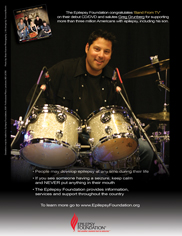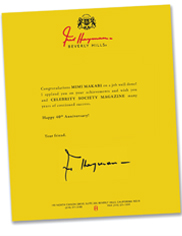
Archived // Cover Story

POWER IN Spirituality:
His Holiness, The Dalai Lama
A Political and Spiritual Leader for the World
By: Nicole Bruno
A Political and Spiritual Leader for the World
By: Nicole Bruno
For almost 60 years, His Holiness, the Dalai Lama, has been a spiritual leader not only among the people of Tibet, but also for people all over the world. At the age of two, his holiness was coined as the rebirth of the 13th Dalai Lama, an honor he embraced. He lives his life devoting himself to three commitments. First is his commitment to human values such as compassion, contentment and self-discipline. Second, is the promotion of religious harmony and finding a common place among the many religions of the world. Third, he is committed to being a strong voice for the people of Tibet as they try to overcome their struggles and find justice. He has spent years traveling the world, helping to enhance the lives of others with his kind actions and words. The messages he shares with others are inspiring and motivate people to do better for themselves and for others. He has found the secret to happiness, spirituality, and most importantly, peace. “It is very important to generate a good attitude, a good heart, as much as possible. From this, happiness in both the short term and the long term for both yourself and others will come,” says His Holiness.
His Holiness, The Dalai Lama has been recognized all over the world for his spiritual and political work. Although his list of awards and honors are endless, there are three special achievements that are rare among all of the others. First, His Holiness became one of four people to be granted honorary citizenship by the Governor General of Canada. Second, he received the very notable Christmas Humphreys award from the Buddhist Society in the United Kingdom. The third and highest honor is one that most people only dream of achieving throughout their life. In 1989, His Holiness was awarded the Nobel Peace Prize for his efforts toward the liberation of Tibet. His speech focused on his desire for non-violent action, and also his desire to continue peaceful progress with China, even if they wished to act otherwise. “If you can, help others; if you can’t, at least do not harm them,” says His Holiness.
Being the fourteenth Dalai Lama holds great responsibilities; not only does he teach the Buddhist worldview through cultural exchange, meeting world leaders, speaking engagements and modern media, but he also campaigns politically for China to return sovereignty to Tibet. Seen recently in France, His Holiness’ heavy schedule for the second half of 2009 includes 23 teachings, talks, symposiums and conferences throughout India, Europe, Australia, New Zealand and North America. Despite the frustration and anger of some of the youngest Tibetan generation, His Holiness sees non-violence as the only way forward, and he believes that the youth are as committed to non-violence as he is. While independence is not yet in sight for Tibet, its spiritual leader’s key concern is very worldly: education. His Office reports that “the lack of [Education] (despite the great efforts of the thirteenth Dalai Lama) was one of the principal reasons the Tibetans had lost their country. The Tibetans must ensure the upholding of their own culture and their place in the world.”
PAST ISSUES // Cover Stories
©2011 CELEBRITY SOCIETY
9606 SANTA MONICA BOULEVARD | THIRD FLOOR | BEVERLY HILLS, CALIFORNIA 90210
CONTACT@CELEBRITYSOCIETY.COM | 310.859.6654
9606 SANTA MONICA BOULEVARD | THIRD FLOOR | BEVERLY HILLS, CALIFORNIA 90210
CONTACT@CELEBRITYSOCIETY.COM | 310.859.6654




























